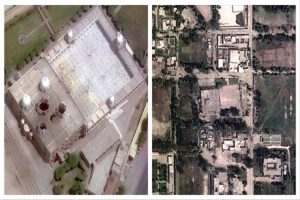Pakistan experienced a fresh jolt on Friday as an earthquake of magnitude 4.2 struck the region, according to the National Center for Seismology (NCS). The quake occurred at a depth of 180 km, reducing its surface impact but adding to a series of recent seismic events in the country.
The NCS posted the earthquake details on platform X, stating:
“EQ of M: 4.2, On: 30/05/2025 13:37:52 IST, Lat: 32.57 N, Long: 69.82 E, Depth: 180 Km, Location: Pakistan.”
EQ of M: 4.2, On: 30/05/2025 13:37:52 IST, Lat: 32.57 N, Long: 69.82 E, Depth: 180 Km, Location: Pakistan.
For more information Download the BhooKamp App https://t.co/5gCOtjcVGs @DrJitendraSingh @OfficeOfDrJS @Ravi_MoES @Dr_Mishra1966 @ndmaindia pic.twitter.com/NpHzIB1UPN— National Center for Seismology (@NCS_Earthquake) May 30, 2025
This comes just a day after a magnitude 4.4 earthquake rattled parts of Pakistan on Thursday. Unlike Friday’s tremor, the earlier quake was shallow — occurring at a depth of just 10 km — making it more prone to aftershocks and potential surface damage.
Thursday’s quake details:
“EQ of M: 4.4, On: 29/05/2025 16:06:56 IST, Lat: 30.14 N, Long: 70.36 E, Depth: 10 Km, Location: Pakistan.”
EQ of M: 4.4, On: 29/05/2025 16:06:56 IST, Lat: 30.14 N, Long: 70.36 E, Depth: 10 Km, Location: Pakistan.
For more information Download the BhooKamp App https://t.co/5gCOtjcVGs @DrJitendraSingh @OfficeOfDrJS @Ravi_MoES @Dr_Mishra1966 @ndmaindia pic.twitter.com/1VZNMT5oSw— National Center for Seismology (@NCS_Earthquake) May 29, 2025
Seismologists note that shallow earthquakes are generally more dangerous, as seismic waves have a shorter distance to travel to the surface, leading to stronger ground shaking and a higher risk of structural damage and casualties.
Pakistan lies in one of the most earthquake-prone regions in the world due to its position at the convergence of the Indian and Eurasian tectonic plates. This tectonic collision zone, particularly active in provinces such as Balochistan, Khyber Pakhtunkhwa, Gilgit-Baltistan, and Pakistan-occupied Jammu and Kashmir, frequently experiences violent seismic activity.
- Sindh and Punjab lie on the Indian Plate
- Balochistan and western Khyber Pakhtunkhwa sit on the Eurasian Plate
- The region borders both the Arabian Plate and the Hindu Kush mountains — further complicating tectonic dynamics.
Given its complex geology and history of destructive quakes, experts continue to stress the importance of earthquake preparedness and resilient infrastructure in Pakistan.





